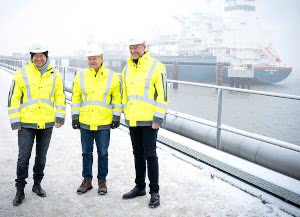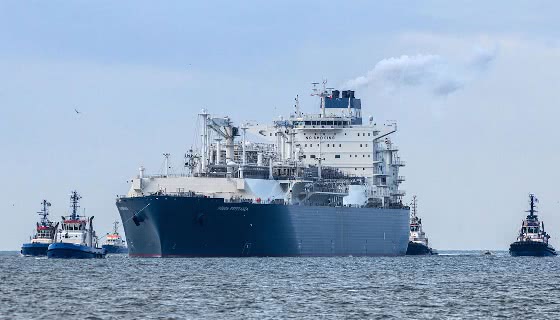
On Saturday in the port of Wilhelmshaven the German government celebrated with great pomp, so much so that - despite the cold day was not propitious - he was represented by Chancellor Scholz, the Vice-Chancellor Habeck and the Federal Minister for Finance Lindner, the start of the new diversification strategy of the supply of energy sources with the inauguration of the new liquefied natural gas terminal which has been Made in just 200 days from design to commissioning service and which involved the positioning of 26 kilometers of pipeline as well as ten-year lease of the Floating Storage and Regasification Unit (FSRU)
Höegh Esperanza, a ship with a transport capacity of 170,000 cubic meters and regasification capacity of 750 millions of standard cubic feet per day that is part of the fleet of Höegh LNG, a Norwegian company that last spring Signed with the German Government the contract for the rental of two FSRU units.
 On Saturday, the Chancellor recalled the reasons for this: But one could say forced, the federal executive to start quickly to this strategy: "Russia's war against Ukraine - said Olaf Scholz - has terrible consequences for Ukrainian citizens and involves dramatic destruction. At the same Time the effects of this war are being felt in the world entire. We in Europe, we in Germany, are seeing this too. high energy prices, inflation and of course also from the fact that we have to think about the issue of security Energy. In this regard, we decided very quickly that We wanted to do everything we could to ensure supply. Germany's energy with gas, regardless of gas supplies from Russia, and therefore already at the beginning of the year we decided that we wanted to build as soon as possible on the German coasts terminals that are able to guarantee this supply independently of pipelines from Russia. When we said that a terminal like this should be built this year here in Wilhelmshaven, many people have stated that it would not have been possible at all and that it would not It would never have worked. The opposite was true: in fact, We managed to install a terminal of this type here in so little time, and today we see here this ship that will take place this task, i.e. the regasification of the gas that is transported here and is destined for the German network. That's A very, very important contribution to our safety."
On Saturday, the Chancellor recalled the reasons for this: But one could say forced, the federal executive to start quickly to this strategy: "Russia's war against Ukraine - said Olaf Scholz - has terrible consequences for Ukrainian citizens and involves dramatic destruction. At the same Time the effects of this war are being felt in the world entire. We in Europe, we in Germany, are seeing this too. high energy prices, inflation and of course also from the fact that we have to think about the issue of security Energy. In this regard, we decided very quickly that We wanted to do everything we could to ensure supply. Germany's energy with gas, regardless of gas supplies from Russia, and therefore already at the beginning of the year we decided that we wanted to build as soon as possible on the German coasts terminals that are able to guarantee this supply independently of pipelines from Russia. When we said that a terminal like this should be built this year here in Wilhelmshaven, many people have stated that it would not have been possible at all and that it would not It would never have worked. The opposite was true: in fact, We managed to install a terminal of this type here in so little time, and today we see here this ship that will take place this task, i.e. the regasification of the gas that is transported here and is destined for the German network. That's A very, very important contribution to our safety."
Scholz specified that the Wilhemshaven terminal is only the first step in a security strategy energy that will continue with the establishment of new LNG terminals in Lubmin, Brunsbüttel and Stade. By the end of 2024 - the chancellor specified - the ability to Gas import should be more than 30 billion meters cubes, which is more than half the amount of gas that passed through pipelines last year from Russia to Germany. "Russian President Putin - has Scholz said - he thought he could blackmail us by interrupting the gas supplies. But he was wrong. We will not be blackmailed."
Scholz pointed out that a load of Höegh Esperanza can supply gas to around 50,000 households for a year and - he added - "from now on a much greater number of ships can dock here in Wilhelmshaven and supply gas many more hundreds of thousands of families and companies".
The project of the new terminal has been implemented by the port authority Niedersachsen Ports, which is of owned by the State of Lower Saxony and which owns and operates five ports including Wilhelmshaven, the pipeline operator OGE and the energy company Uniper. The forecasts are to import through the new terminal, which will be operated by the German Uniper, at least five billion cubic meters of natural gas per year, a volume that represents 6% of the annual gas consumption in Germany which will be used to replace about 7% of gas imported from the Russia.
